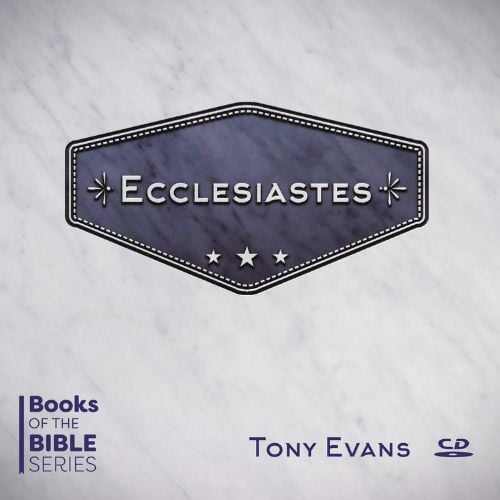A Life Punctuated By God (Ecclesiastes)
In Stock
Tony Evans explores the book of Ecclesiastes and the words of Solomon, who spent the latter part of his life in pursuit of the meaning of life. He concludes that all earthly pursuits are in and of themselves “vanity” or meaningless apart from the fear of God.
Messages Include:
- The Meaninglessness of Earthly Life – Ecclesiastes 1
- Pleasure, Profit and Productivity – Ecclesiastes 2
- There Is an Appointed Time – Ecclesiastes 3:1–4:8
- Oppression and Occupation – Ecclesiastes 4:9–5:16
- A Life Punctuated by God – Ecclesiastes 5:17–7:4
- Wisdom and Folly – Ecclesiastes 7:5-22
- The Value of Obedience – Ecclesiastes 7:23–9:7
- The Uncertainty of a Life Without God – Ecclesiastes 9:8–11:10
- The Sum of the Matter – Ecclesiastes 12
The Meaninglessness of Earthly Life (Ecclesiastes 1) - Solomon, the one who asked God for wisdom and was considered one of the wealthiest and wisest men who ever lived, declares that all that happens on earth, or "under the sun," completely lacks meaning. A lifetime of experience qualifies him to make such a statement.
Pleasure, Profit and Productivity (Ecclesiastes 2) - With his great riches and authority as king, Solomon begins an experiment to find meaning in earthly pursuits. He fills his life with pleasure, work, material possessions and all that his wealth and position can afford. He concludes that it, too, is all meaningless.
There Is an Appointed Time (Ecclesiastes 3:1–4:8) - All that happens does so by appointment. According to Solomon, laboring to change that is futile. Because God has placed eternity in the hearts of humanity, they seek in vain for lasting meaning in a temporary world.
Oppression and Occupation (Ecclesiastes 4:9–5:16) - Solomon claims that it is better for one to have never existed as opposed to living in a world with oppression. The striving to work hard for the purpose of accumulating serves no purpose, either. You can’t find ultimate meaning in this world, therefore you must look beyond it.
A Life Punctuated by God (Ecclesiastes 5:17–7:4) - It is in the light of the futility of wealth, work and pleasure-seeking that Solomon frames these things as gifts from God to enjoy. This is not because pleasure is the purpose of living, but rather it’s the consolation that gives humanity the ability to endure the hardships of life.
Wisdom and Folly (Ecclesiastes 7:5-22) - Solomon makes the claim that times of mourning are better than times of laughter in that they cause one to examine the seriousness of life. With knowledge and wisdom, a person can then see the eternal value that both the good times and the bad times have.
The Value of Obedience (Ecclesiastes 7:23–9:7) - Although each of us has seen people do bad things and go unpunished, Solomon seeks to open our eyes to the eternal justice of God. He will exact vengeance on the wicked and reward on the righteous in accordance with His time schedule, not ours.
The Uncertainty of a Life Without God (Ecclesiastes 9:8–11:10) - So much happens in this world that looks like the roll of the dice. Bad things happen to good people and vice versa. Tony Evans explains that what we call a roll of the dice is, in fact, a life apart from God. Nothing in this life is certain when we distance ourselves from Him.
The Sum of the Matter (Ecclesiastes 12) - The conclusion of Solomon's teaching is that all that matters in this life is obedience to God, whereby the eternal picture of all of life's successes and failures come into focus. The so-called meaningless of earthly life begins to reveal the eternal purpose of life.




